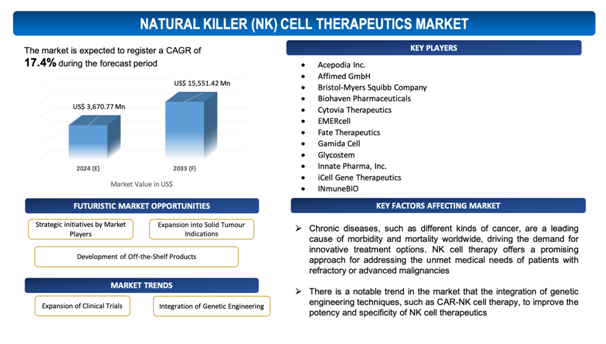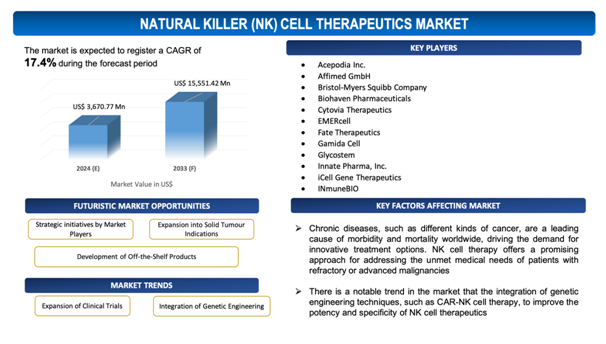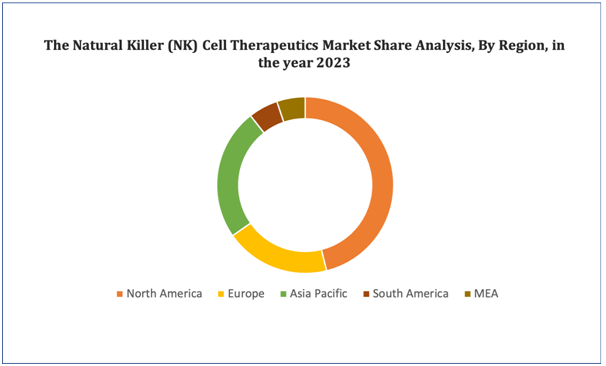Natural Killer (NK) Cell Therapeutics Market Overview
The global Natural Killer (NK) Cell Therapeutics market is estimated to be worth over USD 15,551.42 Mn in 2033 and is expected to grow at CAGR of 17.4% during the forecast period (2024-2033). Natural Killer (NK) cell therapeutics represent a promising frontier in cancer treatment, leveraging the body's innate immune system to battle malignancies. NK cells are a kind of lymphocyte that holds an integral role in immunosurveillance, determining and destroying abnormal cells, comprising cancerous ones, without the necessity for prior sensitization. This innate capability makes NK cells an attractive candidate for cancer therapy.
NK cell therapeutics include isolating and expanding these cells either from the patient's own peripheral blood or from umbilical cord blood or peripheral blood from healthy donors. Once isolated, the NK cells are activated and expanded ex vivo before being infused back into the patient. Upon reinfusion, the activated NK cells target and kill cancer cells through different mechanisms, comprising the release of cytotoxic granules and the induction of apoptosis.
The global market for NK cell therapeutics is witnessingsubstantial growth, fueled by several key factors. Primarily, there is a soaring understanding of the intricate interactions between the immune system and cancer, paving its way to increased interest in immunotherapies like NK cell therapy. Secondly, advancements in cell therapy manufacturing technologies, such as closed-system bioreactors and automated cell processing systems, have enhanced the scalability and reproducibility of NK cell production, making it more feasible for widespread clinical use.
Furthermore, the rise of biopharmaceutical companies specializing in NK cell therapy research and development, along with collaborations between academia and industry, has propelled the pace of innovation in this field. Several NK cell-based therapies are currently in clinical trials across various cancer types, showing promising results in terms of safety and efficacy. In addition to that, regulatory agencies are showing increasing interest in advancing NK cell therapies through expedited review pathways, further driving market growth.
Regardless of these advancements, challenges persist, comprising optimizing NK cell expansion protocols, overcoming immunosuppressive tumor microenvironments, and ensuring the long-term persistence of infused NK cells. However, with ongoing research efforts, technological innovations, and a growing body of clinical evidence supporting the efficiency of NK cell therapeutics, the global market for these innovative cancer treatments is poised for continued expansion, offering new hope for patients with refractory or advanced malignancies.
Figure 1. Natural Killer (NK) Cell Therapeutics: Market Size

Get more details on this report - Request Free Sample
Key Market Insights &Current Market Landscape:
The global Natural Killer (NK) cell therapeutics market is witnessingrobust growth and transformation, driven by key market insights and significant developments in the field of immuno-oncology. Major insights include the innate ability of NK cells to target and destroy cancer cells without prior sensitization, making them an attractive candidate for cancer therapy. The market landscape is characterized by a soaring pipeline of NK cell-based therapies targeting various malignancies, fueled by advancements in cell therapy manufacturing technologies and a deepening understanding of NK cell biology. Significant developments comprise the optimization of NK cell isolation, expansion, and activation protocols, as well as the emergence of novel technologies such as genetic engineering techniques to enhance NK cell potency and persistence. In addition to that, collaborations between academia, biopharmaceutical firms, and regulatory agencies are propelling the translation of NK cell therapeutics from preclinical research to clinical application. With promising clinical trial results and regulatory approvals on the horizon, the global NK cell therapeutics market is poised for continued expansion, providing new hope for patients with refractory or advanced cancers.
Market Dynamics
Market Drivers
Increase in Patient Population with Chronic Diseases
Chronic diseases, such as differentkinds of cancer, are a leading cause of morbidity and mortality worldwide, driving the demand for innovative treatment options. NK cell therapy offers a promising approach for addressing the unmet medical needs of patients with refractory or advanced malignancies. Unlike traditional treatments, which may be associated with significant side effects and limited efficacy, NK cell therapy harnesses the body's innate immune system to target and destroy cancer cells. This approach not only offers a potentially safer and more effective alternative for patients but also aligns with the growing trend towards personalized and immunotherapy-based cancer treatments. As the prevalence of chronic diseases continues to increaseacross the globe, propelled by factors such as aging populations and lifestyle changes, the demand for novel therapeutic interventions like NK cell therapy is estimated to rise, driving market growth and innovation in the field.
Market Restraints
With regard to numerous advantages of Natural Killer (NK) Cell Therapeutics, the market faces several challenges due to the unique characteristics and requirements associated with them. Some of the key market challenges include:
- Manufacturing Complexity: The complicated and costly manufacturing process involved in isolating, activating, and expanding NK cells presents a notable restraint for the global NK cell therapeutics market, limiting scalability and contributing to increased treatment costs.
- Limited Clinical Evidence: Despite promising preclinical results, the limited clinical evidence demonstrating the long-term safety and efficiency of NK cell therapies in large patient populations presents a restraint on market adoption and regulatory approval, impeding widespread acceptance and reimbursement.
Market Opportunities
Strategic initiatives by Market Players
As pharmaceutical firms, biotech companies, and research institutions increasingly emphasize on advancing NK cell therapy research and development, collective efforts and partnerships are forming to propel innovation and bring novel therapies to market. These strategic initiatives surround a broad range of activities, comprising clinical trial partnerships, preclinical research collaborations, licensing agreements, and mergers and acquisitions. By pooling resources, expertise, and intellectual property, leading market players can overcome barriers to entry, align development processes, and leverage complementary strengths to improve the effectiveness and commercial viability of NK cell therapies. In addition to that, strategic alliances allow access to diversified pipelines, novel technologies, and specialized expertise, fostering a dynamic ecosystem of innovation within the NK cell therapeutics market. Along with that, collaborations with regulatory agencies and healthcare stakeholders can expedite regulatory approval pathways and facilitate market access, fueling adoption and market growth. Overall, strategic initiatives by market players present opportunities to advance the field of NK cell therapy, expand treatment alternatives for patients with refractory or advanced malignancies, and drive sustainable growth within the global NK cell therapeutics market.
Market Trends
- Expansion of Clinical Trials: A significant trend in the global NK cell therapeutics market is the expansion of clinical trials evaluating NK cell-based therapies across different cancer types and treatment settings. This trend mirrorsgrowing interest and investment in advancing NK cell therapy research and development, fueled by promising preclinical data and the growing understanding of NK cell biology.
- Integration of Genetic Engineering: Another notable trend is the integration of genetic engineering techniques, such as CAR-NK cell therapy, to improve the potency and specificity of NK cell therapeutics. This trend represents a shift towards more targeted and customizable treatment approaches, offering new opportunities for enhancing patient outcomes and overcoming challenges associated with off-the-shelf NK cell therapies.

Get more details on this report - Request Free Sample
Natural Killer (NK) Cell Therapeutics Market: Key Segments
By Therapeutics
- NK Cell Therapies
- NK Cell Directed Antibodies
By Approaches
- Antibody-Dependent Cell-Mediated Cytotoxicity (ADCC)
- Bispecific Antibodies
By Application
- Cancer
- Immunoproliferative Disorders
- Acute Infectious Diseases
- Gastrointestinal Diseases
- Others
By End User
- Research & Academic Institutes
- Hospitals
- Specialty Clinics
By Distribution Channel
- Hospital Pharmacies
- Direct Tender
- Others
By Key Geographical Regions
- North America
- Europe
- Asia-Pacific
- Middle East and Africa
- South America
Natural Killer (NK) Cell Therapeutics Market: Regional Analysis
North America is dominating due to the presence of key market players in the largest consumer market with high GDP. The U.S. is expected to grow due to the rise in technological advancement in the market. The U.K. dominates the Europe region due to the mass production of technologically advanced therapeutics and increasing demand from emerging markets and expansion of industries. China dominates the Asia-Pacific region due to rising awareness of regular health check-ups.
Figure 4. Natural Killer (NK) Cell Therapeutics Market: Distribution by Region

Get more details on this report - Request Free Sample
Leading Natural Killer (NK) Cell Therapeutics Developers
Industry Trends and Global Forecasts, 2023-2035 report features an extensive study of the current market landscape, market size and future opportunities associated with the Natural Killer (NK) Cell Therapeuticsmarket, during the given forecast period. Further, the market report highlights the efforts of several stakeholders engaged in this rapidly emerging segment of the biopharmaceutical industry. Key takeaways of the Natural Killer (NK) Cell Therapeuticsmarket are briefly discussed below.
The report includes the list of players operating in the global Natural Killer (NK) Cell Therapeuticsmarket. Some of the key players include:
- Acepodia Inc.
- Affimed GmbH
- Bristol-Myers Squibb Company
- Biohaven Pharmaceuticals
- Cytovia Therapeutics
- EMERcell
- Fate Therapeutics
- Gamida Cell
- Glycostem
- Innate Pharma, Inc.
- iCell Gene Therapeutics
- INmuneBIO
- ImmunityBio, Inc.
- Multimmune GmbH
- Merck KGaA
- Phio Pharmaceuticals
- PersonGenBioTherapeutics
- Sanofi
- Regeneron Pharmaceuticals Inc
- Takeda Pharmaceutical Company Limited
Recent Developments in the Natural Killer (NK) Cell Therapeutics Market
Several recent developments have taken place in the field of Natural Killer (NK) Cell Therapeutics, some of which have been outlined below. These developments, even if they took place post the release of our market report, substantiate the overall market trends that we’ve outlined in our analysis chronologically.
- In January 2024, Indapta Therapeutics, Inc., a privately held biotechnology company developing IDP-023, a natural killer (NK) cell therapy for the treatment of cancer, announced that the company has initiated treatment of the first patients in its Phase 1 trial in multiple myeloma and Non-Hodgkin’s lymphoma.
Scope of the Report
The market report presents an in-depth analysis of the various firms / organizations that are engaged in this market, across different segments, as defined in the below table:
|
Key Report Attributes |
Details |
|
Base Year |
2023 |
|
Forecast Period |
2024-2033 |
|
CAGR (2024-2033) |
17.4% |
|
Therapeutics |
|
|
Approaches |
|
|
Application |
|
|
End User |
|
|
Distribution Channel |
|
|
Key Geographical Regions |
|
|
Key Companies Profiled |
|
